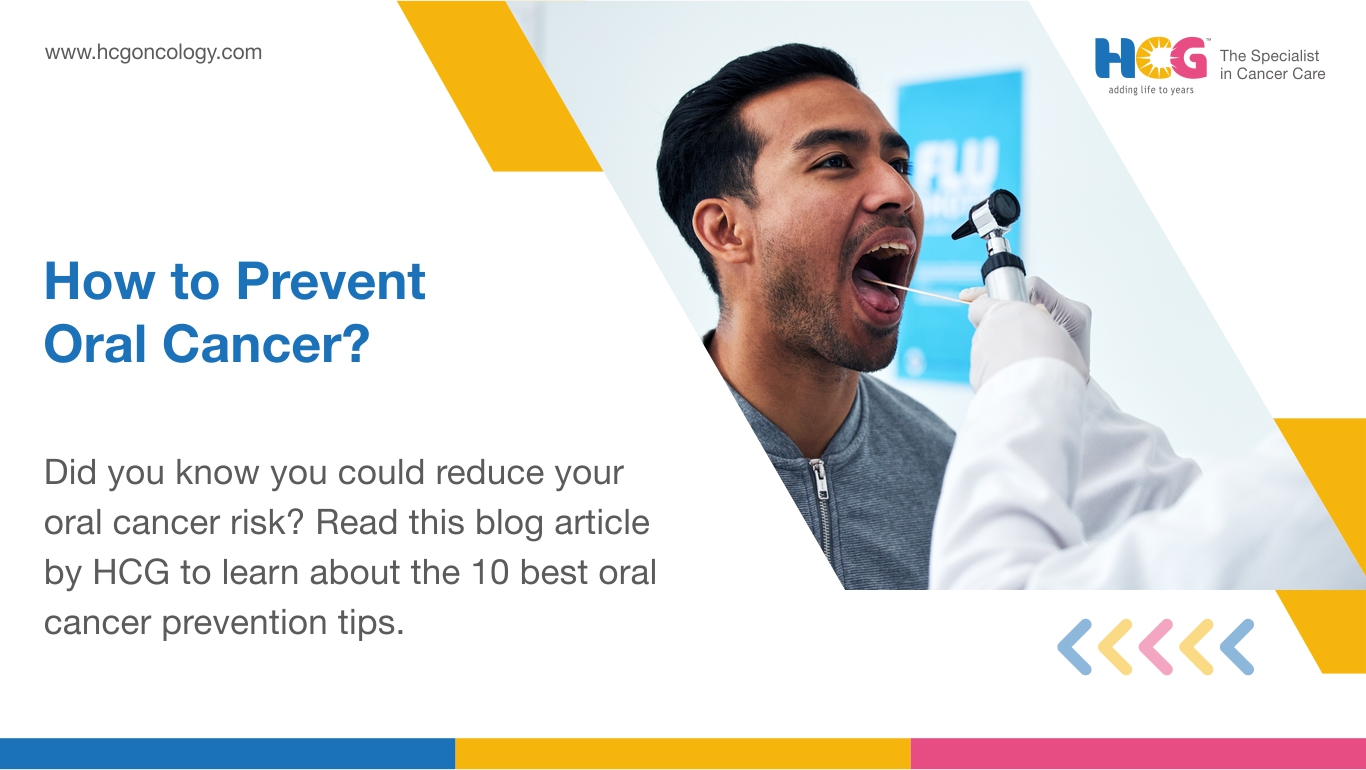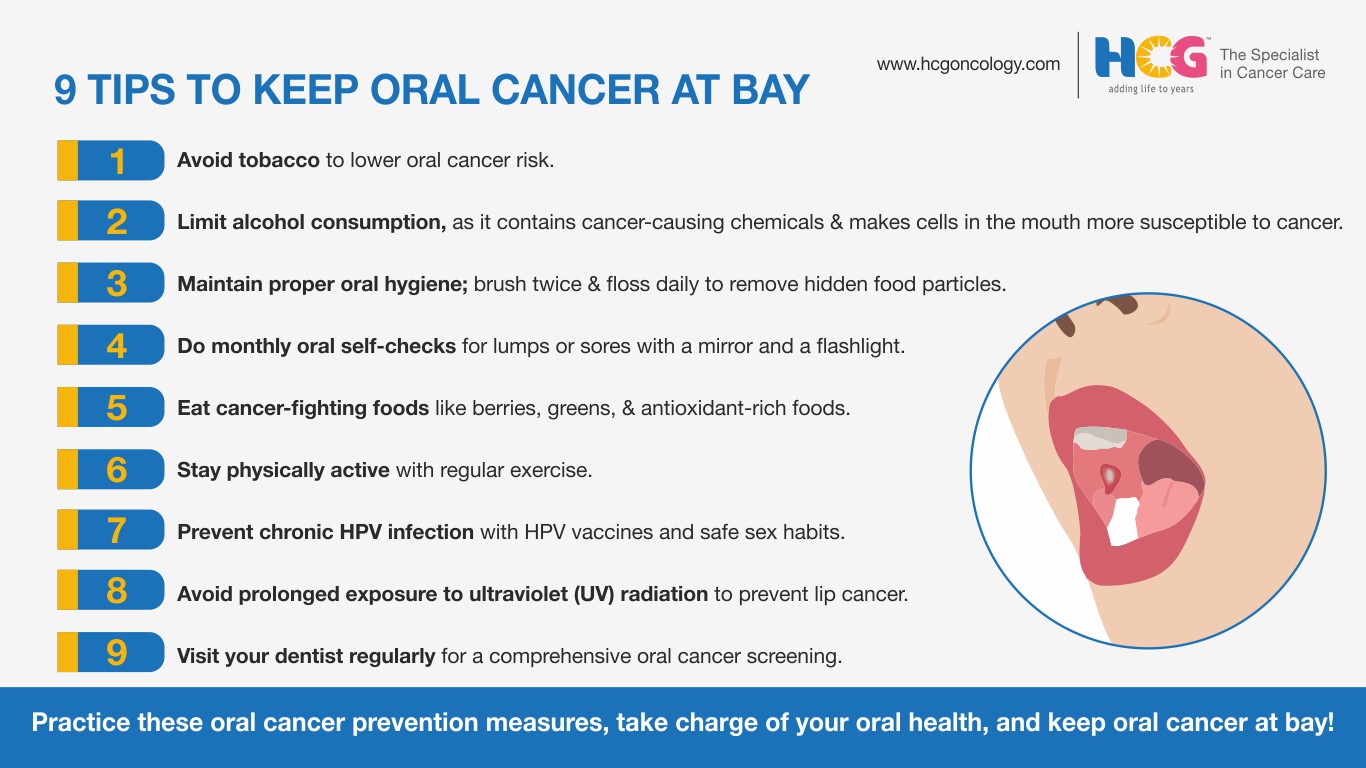
22 Dec, 2025
Feel free to reach out to us.

22 Dec, 2025

This article is medically reviewed by Dr. Chandrasekhar Prasad Singh, Consultant - Medical Oncology, HCG-Abdur Razzaque Ansari Cancer Hospital, Ranchi.
Oral cancer, commonly known as mouth cancer, develops on the tongue, under the tongue, at the base of the tongue, and the tissue lining the mouth. Soreness, tongue irritation, and difficulty chewing are some of the early signs of oral cancer. Mostly, it has been observed that oral cancers happen because of smoking, tobacco, and drinking alcohol.
Oral cancer refers to the cancer of the mouth. It is considered a type of head and neck cancer. Oral cancer most commonly arises from the squamous cells, which are the flat cells that line the surface of our mouth, tongue, and lips. If not recognized earlier, the cancer cells may spread to nearby and distant tissues and become fatal.
One must consult a doctor if there are persistent sores in the mouth, red/white patches, difficulty swallowing/chewing, ear pain, a sore throat, or the presence of a lump in the neck. These symptoms can be early signs of oral cancer.
Oral cancers are classified into two main types.
1. Squamous Cell Carcinoma: It is considered the most common type of oral cancer, arising from the squamous cells that line the oral cavity.
2. Other Types: Additionally, cancers of the salivary glands, melanomas (from pigment-producing cells), lymphomas and sarcomas are included. However, these types of cancers are very rare.
Oral cancer is one of the most common cancers in India. But still, many people lack awareness about it and its prevention. Many people believe that being young, not smoking, and refraining from alcohol means they are not at risk. However, this is not completely true. In recent times, oral cancer is becoming more and more common across the world, and therefore, we should talk more about the prevention of oral cancer.
Additional Reading: To know more about how to prevent oral cancer, here is another article that can help you increase your knowledge: Oral Cancer Prevention | It’s in Your Hands! | HCG Oncology

If you are someone who consumes tobacco and alcohol, then you have a likely higher chance of having oral cancer. According to The International Agency for Research on Cancer (IARC), 70% of oral cancer cases are caused by tobacco.
Refraining from the consumption of tobacco and alcohol is one of the critical oral cancer prevention measures.
Good oral hygiene is crucial to reducing the risk of oral cancer. Maintaining good oral hygiene is also an important preventive measure against oral cancer. Brushing your teeth at least twice daily is the primary prevention of oral cancer.
Chewing betel nuts is very common, but many don’t know that it causes significant health issues, including oral cancer. According to the International Agency for Research on Cancer (IARC), betel nuts contain arecoline, a chemical compound that can damage the DNA in your cells and cause the development of oral cancer. Constantly chewing betel nuts can lead to significant damage inside the mouth.
Consumption of alcohol is one of the major oral cancer risk factors. Consuming alcohol in large amounts or for a long period can increase the risk of developing cancer in the mouth.
If you are someone who gets excessive sun exposure, you may have a higher risk of having lip cancer, a type of oral cancer. Protect your lips by applying a lip balm that contains SPF 30 when going outside in the sun.
Sometimes oral cancer can develop without any noticeable early signs, which is why regular self-examination is very important to detect the early symptoms of oral cancer. You should regularly examine your lips and inspect the inside of your mouth and gums to detect the early signs of oral cancer.
Human Papillomavirus (HPV) is a group of over 200 viruses that cause different types of cancer, including oral cancer. HPV infection is one of the leading causes of oropharyngeal cancers (cancers of the throat, tongue, and tonsils). The HPV vaccine, which prevents chronic HPV infections, helps reduce the risk of oropharyngeal cancers.
HPV infections are majorly caused by sexual contact, including oral sex. The virus gets transmitted through direct contact with an infected person’s genital or oral area during sex or kissing. Although not every person who contracts HPV will develop cancer, this virus can cause abnormal changes to the cells in the mouth and can lead to oral cancer.
Therefore, it is essential to manage chronic HPV infections effectively and opt for regular health checkups to prevent them.
Additional Reading: Want to know how HPV infection can increase the risk of oral cancer? Here is an interesting article by one of HCG’s specialists explaining the role of HPV infection as a risk factor for oral cancer: Can Chronic HPV Infection Cause Head and Neck Cancers?
Most common oral cancer risk factors such as alcohol, tobacco, and HPV infections, are well known, but what many don’t know is that maintaining a good lifestyle and doing regular exercise can reduce the risk of developing oral cancer. Regular exercise can boost your immune system and lower the risk of oral cancer.
To avoid oral cancer, regular dental check-ups are crucial and play an important role in the early detection of oral cancer. Oral cancer is mostly diagnosed late, but if we visit our dentist regularly, we may be aware of how to stop oral cancer on time.
Spreading oral cancer awareness is critical to reducing the risk of this disease. Understanding the risk, knowing how to stop oral cancer, prioritizing early detection and timely treatment can play a major role in conquering oral cancer. Although consumption of tobacco, HPV infection, alcohol, and oral cancer are majorly linked, it is very important to remember that anyone can be at risk, regardless of age and lifestyle. Taking preventive measures, maintaining a healthy lifestyle, and early detection can be the key to winning over oral cancer.
At HCG, we treat different types of cancer, including oral cancer, with a personalized treatment approach that not only positively impacts the treatment outcomes but also preserves the quality of life.

Dr. Chandrashekhar Prasad Singh
Consultant - Medical Oncology
MBBS, MD (Medicine), DNB (Medical Oncology)
Dr. Chandrashekhar is an experienced medical oncologist who specializes in the management of breast, thoracic, and GI tract malignancies. He is available for consultation at HCG-Abdur Razzaque Ansari Cancer Hospital, a leading cancer hospital in Ranchi. He graduated with an MD degree and a gold medal and has multiple publications in medicine in renowned Indian and international journals. His approach to cancer care is patient-centric, and he strives to provide the best care possible for his patients.
To book an appointment with Dr. Chandrashekaar Prasad Singh, please click here.